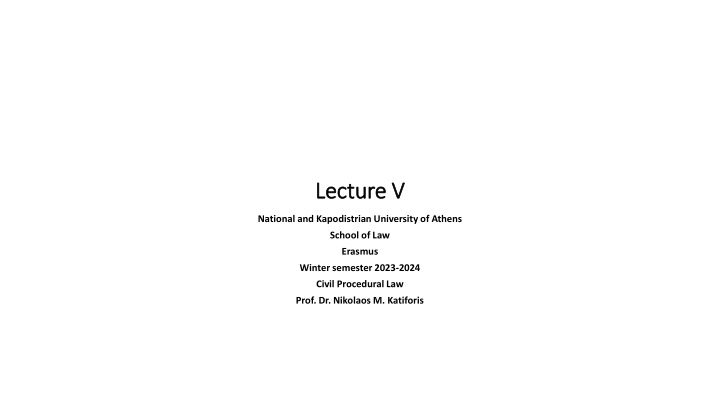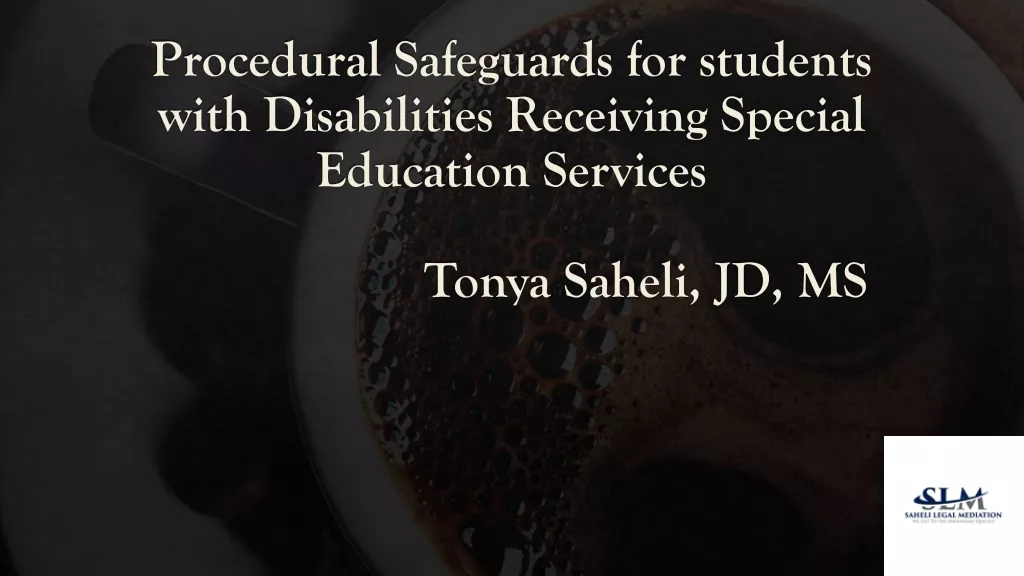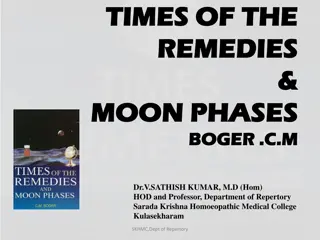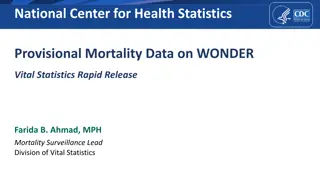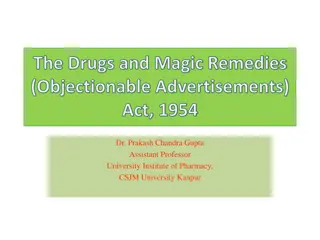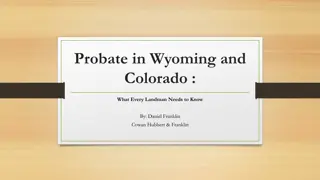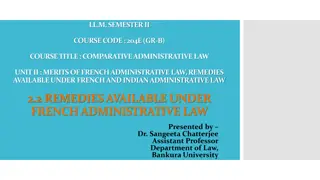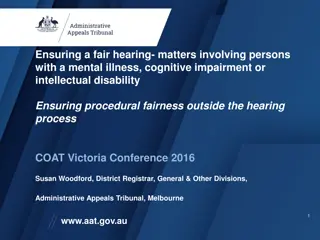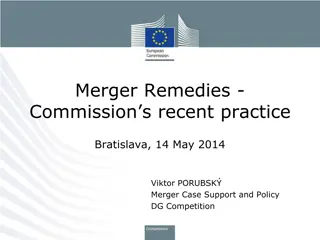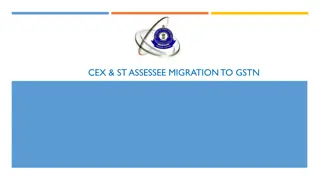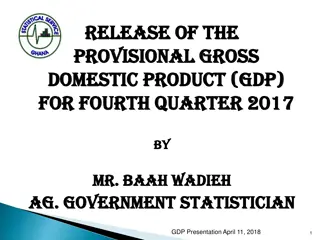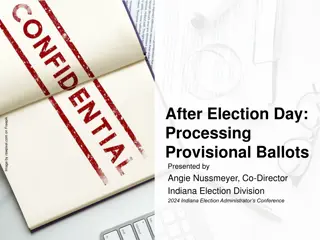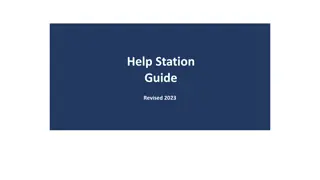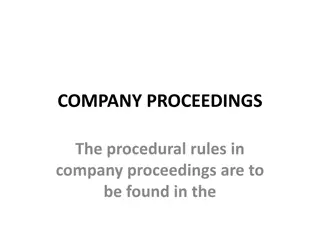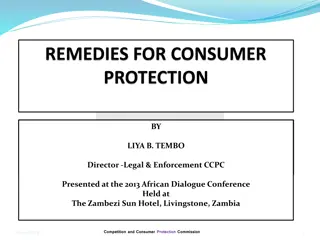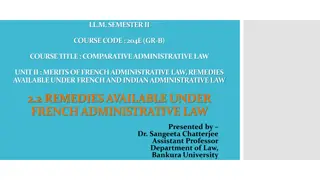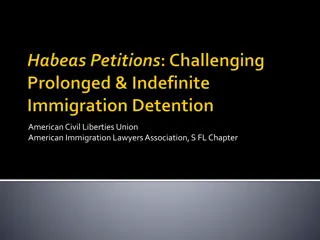Proceedings for Provisional Remedies in Civil Procedural Law
Greek legal theory distinguishes between conservatory and regulatory provisional remedies to secure substantive rights or provisionally arrange disputed situations. These remedies are constitutionally guaranteed and granted under specific substantive and procedural conditions. The procedure involves submission of applications, hearings with flexible frameworks, and decisions based on the applicant's probable allegations without leading to full satisfaction of the substantive right.
Download Presentation

Please find below an Image/Link to download the presentation.
The content on the website is provided AS IS for your information and personal use only. It may not be sold, licensed, or shared on other websites without obtaining consent from the author.If you encounter any issues during the download, it is possible that the publisher has removed the file from their server.
You are allowed to download the files provided on this website for personal or commercial use, subject to the condition that they are used lawfully. All files are the property of their respective owners.
The content on the website is provided AS IS for your information and personal use only. It may not be sold, licensed, or shared on other websites without obtaining consent from the author.
E N D
Presentation Transcript
Lecture V Lecture V National and Kapodistrian University of Athens School of Law Erasmus Winter semester 2023-2024 Civil Procedural Law Prof. Dr. Nikolaos M. Katiforis
1. Proceedings for Provisional Remedies 1. Proceedings for Provisional Remedies 1.1. Introductory remarks: 1.1.1. Greek legal theory distinguishes within the scope of provisional remedies between two main categories: a) Conservatory measures, which tend to secure the future satisfaction of a substantive right; and b) Regulatory provisional remedies, granted in order to provisionally arrange disputed situations through orders for specific acts, omissions or indulgences (e.g. in disputes related to possession, unfair competition, family relations etc.); A particular kind of this second category is the provisional adjudication of claims (i.e. related to maintenance, salaries, damages etc.). 1.1.2. Provisional remedies are generally regarded as one of the constitutionally guaranteed forms of legal protection.
1. Proceedings for Provisional Remedies 1. Proceedings for Provisional Remedies 1.2. General Prerequisites 1.2.1. Substantive Conditions: (a) Provisional remedies may be granted in order to secure or conserve a substantive right, having already become or expected to eventually become the object of litigation in proceedings through a principal action; (b) The second condition of provisional remedies lies either with the existence of an urgent situation or with the avoidance of an imminent danger. 1.2.2. Procedural Prerequisites: (a) Jurisdiction for granting provisional relief extends only to matters belonging to Civil Courts. One-member district courts enjoy general subject matter competence with regard to provisional remedies. (b) In addition to the particular competence of the court located closest to the place of enforcement, territorial competence for provisional relief depends on the general stipulations (i.e. defendant s domicile, seat, courts of the situs etc.). (c) Persons not generally enjoying the capacity to conduct proceedings may be granted this capacity when their participation is justified for the avoidance of an imminent danger; Under the above condition, parties are allowed to conduct litigation in person, without being represented by an attorney.
1. Proceedings for Provisional Remedies 1. Proceedings for Provisional Remedies 1.3. Procedure for granting Provisional Remedies 1.3.1. Commencement of Proceedings: Submission of the relevant application. The hearing of the case is then appointed by the competent judge and usually takes place within a few days. Ex parte proceedings are allowed, but only under extremely urgent circumstances. 1.3.2. Main Hearing: The sole oral hearing is based on a flexible procedural framework with regard to both the authority of the judge for relying on facts not submitted by the parties and the free admissibility (and the free evaluation) of any available means of proof. 1.3.3. An affirmative decision is allowed when the allegations of the applicant have been shown as probable. 1.4. Decision on the application: Provisional remedies must not lead to the full satisfaction of the substantive right, which they seek to secure or conserve. 1.5. The provisional Res Judicata: The provisional binding effect does not influence the main proceedings.
1. Proceedings for Provisional Remedies 1. Proceedings for Provisional Remedies 1.6. Methods of Review: Provisional Remedies may not be attacked by any methods of review whatsoever. 1.7. Enforcement: Provisional remedies may function as executory titles and be enforced in technical sense when arranging a disputed situation through orders concerning a specific act, omission or indulgence, or when provisionally adjudicating over certain claims. 1.8. Revocation: 1.8.1. A mandatory revocation of a provisional measure is always dependent on the outcome of main proceedings, thus revealing its conservatory or overall accessory character. 1.8.2. Revocation of a provisional measure may be ordered: (a) On the discretionary power of the same judge who has issued it if justified through allegations for change in real conditions under which a provisional remedy was issued). It may also be demanded by any party, or third person, on the ground of his non-participation in or non- summoning to the proceedings. (b) By the competent court, while proceedings of the main action are pending, without any special condition to be required.
1. Proceedings for Provisional Remedies 1. Proceedings for Provisional Remedies 1.9. Provisional Order: It belongs to the discretion of the Judge, as soon as the request for provisional remedies has been brought, to issue, even ex officio, this form of prompt relief, usually by a simple note on the application itself, as a rule without summoning the opposing party, except when the judge deems that the appearance of the other party is necessary.
2. Default Proceedings 2. Default Proceedings 1. A defendant s default at the hearing of the case results in the rendition of a judgment for plaintiff. This is effectuated on the basis of an assumed confession from the defendant s absence with regard to the grounds of the action, provided that such a confession is generally permitted (e.g., this is not the case in matrimonial disputes). Before proceeding to the rendition of a default decision, the court is obliged to investigate whether: a) all procedural prerequisites have been met; and b) the action is legally founded. 2. When the plaintiff fails to make an appearance at the hearing, provided that the defendant has been summoned on the plaintiffs initiative, the action is dismissed. The dismissal of the action, if admissible and legally founded, is then deemed as based on substantive grounds.
3. Ex Parte Proceedings 3.1. Voluntary Jurisdiction: The ex parte proceeding of voluntary jurisdiction is commenced at the request of an interested person. The application must in some instances be served on the public prosecutor. In addition, the judge can order the summoning of any third person who has a legal interest for participating in the proceeding. Impleader and principal or accessory interventions of third persons are permissible. 3.2. Orders for payment and Provisional Remedies: Orders for payment are always issued through an ex parte proceeding. Provisional remedies can also, exceptionally, be granted through an ex parte proceeding.
4. Review Proceedings 4.1. Introductory remarks: Methods of review are understood as the procedural acts whereby a party to litigation aggrieved by a judicial decision seeks to have the case reconsidered, entirely or partly, whether before the same court or before a court of a superior rank, for the purpose of correcting its errors. 4.2. Ordinary and extraordinary methods of review: Ordinary methods are defined as those which can attack all final judgments on any grounds, irrespective of their relation to fact or to law. Extraordinary methods of review, on the contrary, can be employed which have already had a res judicata effect, solely on the basis of specific grounds exclusively provided for by statute.
4. Review Proceedings 4.3. Admissibility: (a) The decision attacked must be appealable and the persons attacking it must have been parties pr interveners in the action, or their heirs or other successors; (b) The party attacking the decision must have a legal interest, which consists of the prejudice of a losing party, whether defeat is total or partial, sought to be avoided by the given method of review; (c) Application of the appropriate formalities and observance of the time limitation provided. (d) Against the same decision a given method of review can be employed only once by the same party, except if the one first utilized has been withdrawn
4. Review Proceedings 4.4. Opposition Against Default: 4.4.1. Opposition on a default judgment is permissible solely on the conditions that the defaulting party was not at all summoned, or that this party was not duly or timely summoned, or, finally, that the absence of the defaulting party can be attributed to circumstances coming under the abstract concept of force majeure . 4.4.2. Restriction of opposition on default judgments rendered at the first hearing of the case is counterbalanced by another provision which instead permits a full appeal. 4.4.3. Opposition against default is subject to a time limit of 15 days when the defaulting party resides in Greece, or 60 days when this party resides abroad, or is of unknown residence. This period of time begins to run upon service of the default judgment. 4.4.4. Opposition to default judgments, when successful, results in a new examination of the merits.
4. Review Proceedings 4.5. Appeal 4.5.1. General Aspects: Appeal is intended to be a method of complete jurisdiction in the sense that: it allows a full re-examination of the case by the court of a higher rank on points of both fact and law, whether procedural or substantive. 4.5.2. Appellate proceedings are (a) in principle restricted to the grounds of complaint against the judgment put forward by the parties and (b) as a rule based solely on the material presented at first instance. 4.5.3. Conditions to admissibility: (a) Non-final decisions are generally not appealable; (b) An appeal is available right after the publication of the decision; The time to appeal is thirty days when the appellant resides in Greece and sixty days when he resides abroad or is of unknown residence; In case no judgment is served, time to appeal runs from the day of publication and is then two years. 4.5.4. The grounds of appeal: A general complaint against a decision that is erroneous does not suffice to admissibly initiate an appellate proceeding. It is required that a notice of appeals includes specific concretization of at least one error, be it a false interpretation of legal norms or an error related to fact finding.
4. Review Proceedings 4.5.5. The appellant is, moreover, entitled to submit an additional document, containing new grounds of appeal, on the condition that these concern the parts of the judgment of the court below already challenged by the initial notice of appeal, or those necessarily related to them. 4.5.6. Effects: The commencement of an appellate proceeding has three effects: (a) suspensive, which refers to the stay of execution which results from both the time period and the initiation of a proceeding on appeal; (b) devolutive, which marks the extent of the powers granted to the court of the higher level. This court is restricted to the grounds of appeal, including any additional ones, put forward by the parties; communicative, which is connected to the right of the respondent to bring a cross-appeal.
